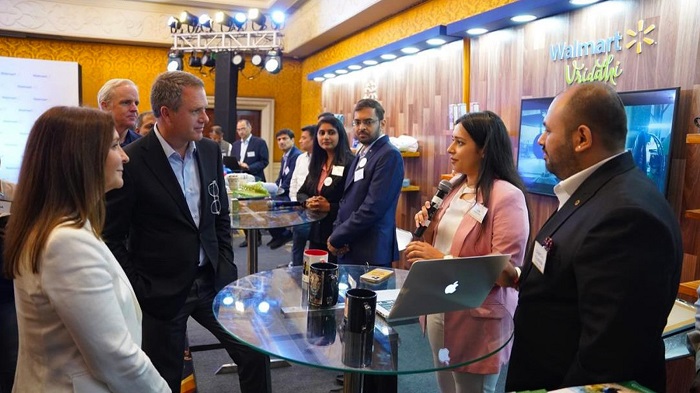This week, Walmart Inc. CEO Doug McMillon reinforced Walmart’s continued commitment to building an ecosystem of suppliers and partners in India, including small and medium enterprises, to meet the company’s goal of sourcing $10 billion of India-made goods each year by 2027.
McMillon was joined by Walmart International CEO Judith McKenna, as well as other members of the Walmart leadership team, in Bangalore, India, to meet with suppliers, merchants, grantees, artisans and MSMEs across key Indian programs and initiatives – including Walmart Sourcing, Walmart Vriddhi, Flipkart and Flipkart Samarth, PhonePe, Walmart Marketplace, Walmart Global Tech in India and the Walmart Foundation. It was a first-of-a-kind gathering of all the group entities under one roof.
“We are committed to India and are here for the long term. I was excited to meet with the diverse Indian ecosystem of suppliers, small and medium enterprises, merchants and partners who are innovating and driving growth and opportunities,” said McMillion.
McMillon continued, “We look forward to continuing to work together with our partners to make quality, affordable, sustainable products for our customers and members, help businesses grow, create jobs, strengthen resilient communities, and accelerate India’s progress as a manufacturing destination. This ties into our goal to expand our exports of ‘Made in India’ products from India to $10 billion each year by 2027.”
With a long history in India, the company continues to build out a holistic ecosystem that includes a wholesale cash-and-carry business, eCommerce platforms, a payments and financial services platform, as well as logistics and supply chain capabilities.
McMillon and McKenna toured the stalls of suppliers present across the group from Walmart Sourcing, Walmart Vriddhi, Walmart Marketplace, Flipkart and Flipkart Samarth. There was one overarching theme across the suppliers: opportunity.
One supplier, Mrs. Bector’s Food Specialty Ltd., presented their cookies to McMillon and McKenna. The company was established by Rajni Bector, a Ludhiana-based housewife. Since then, it has become a household name and is known for bestsellers like Bourbon, crackers and Cremica. It is sold in over 23 states through 550,000 outlets in India. Upon hearing the company’s origin story from Mrs. Bector’s son and grandson, and their journey with Walmart, McKenna said, “Your mother would be very proud.”
There was also Vrinda Khurana, a young entrepreneur from Panipat, Haryana, who transformed her old family business into Chandan Textiles, a maker of customized gift products, such as customized mugs, sweatshirts, t-shirts and bottles. The Vriddhi program, Walmart’s free training program to help MSMEs expand their reach, helped Vrinda learn and apply eCommerce optimization tools and tactics, inventory management, and advertising and marketing strategies. Through Flipkart, Vrinda has been able to reach more customers and see stronger sales.
Also attending was Glide Route Ventures LLP, another Flipkart seller offering products in beauty and grooming. The company registered as a Flipkart seller in 2019, and two brands within its portfolio went on to become bestsellers on the eCommerce platform. The company’s co-founder, Ekta Shah acknowledged that Flipkart’s Seller Support team and Account Manager were of great help. Her company has grown from five brands to over 40 beauty and cosmetic brands.
Another seller at the event was The Trident Group, one of India’s largest exporters of home textile products including bedding, towels and carpets. The company is also a leader in sustainability. In 2020, Walmart recognized Trident as a “Giga Guru” helping drive Project Gigaton, Walmart’s initiative to reduce emissions in the global value chain by one billion metric tons by 2030.
As a socially responsible organization focused on creating economic opportunity, enhancing long-term environmental sustainability and strengthening local communities, Walmart is determined to help drive India’s growth story and create shared value. In addition to investing in programs and initiatives helping local sellers and suppliers, Walmart is helping improve farmer livelihoods through the Walmart Foundation, aiming to reach 1 million smallholder farmers by 2028 – at least half of whom will be women.
Source: Walmart


